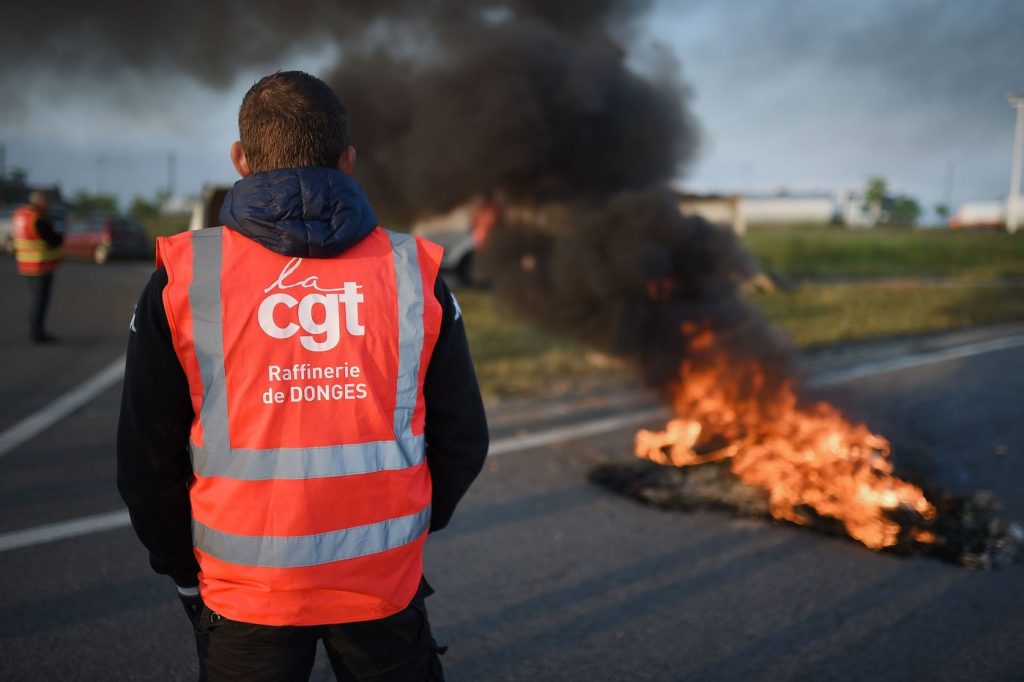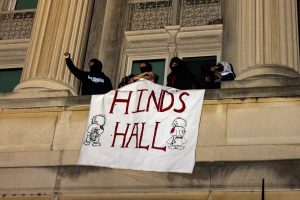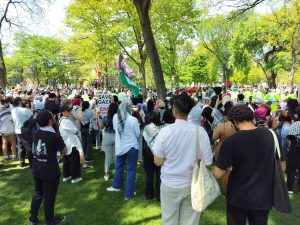Photo: Révolution Permanente
Our first printed issue, A New Generation Rises Up is out! Order online here . For shipping outside the US, write us at [email protected]
— –
This is a translation of an article originally published in French in Révolution Permanente .
This journalist’s reaction is not an isolated case. On the contrary, it is an expression of the French bourgeoisie’s disarray in the face of the challenges and high costs of the ongoing social protests in the country. Extrapolating his argument to absurdity so as to play down the unpleasant reality, he adds, “And what if the French soccer team went on strike? After all, they are the only ones left: Air France pilots start strike action tomorrow, Paris is strewn with uncollected garbage on the eve of the Euro 2016 opening game on Friday, and the train lines RER B and D serving the stadium Stade de France might be blocked; then, why shouldn’t the French national soccer team make us relive that famous incident in Knysna, when during World Cup 2010 the players had refused to get off their bus? In France today, with blockades bordering on the absurd, an additional touch of ridiculousness would not shock any of us.”
The fact is that the bourgeoisie and its acolytes, used to buying propaganda to render workers invisible and unaccustomed to hardcore class struggle, now have to put up with a social protest, which -although it has so far been contained–is still very much alive and kicking. No member of the French political class expected such a degree of working class combativeness and determination, which continues even through the start of the Euro cup, with garbage collectors extending their struggle, Air France pilots beginning a strike on Saturday expected to lead to the cancellation of 20 to 30 percent of all flights–not to mention the 35,000-strong mass demonstration in Le Havre, one of the most prominent protests to have taken place in the port city in the last three months of protests.
Workers and their methods of struggle, namely strikes and picket lines, have become the main bulwark against the ongoing social counterrevolution, revealing a powerful force which the new government to be formed in 2017 will have to measure up against–regardless of recent bravado from various presidential candidates.
The government underestimated the unions
Slowly, the lackeys of the bourgeoisie start to reflect upon the last months’ events, which resemble a horror movie to them. Up until now, they were repeating like parrots that the blame laid with the radicalization of the union confederation CGT–as if the country’s largest employer federation MEDEF was formed by pussy cats.
Les Echos newspaper has begun to act a bit more seriously though: “In this affair, the government cannot lay the entire blame for the conflict on CGT, whether the latter has radicalized or not. The government played it by ear during the entire process. The prime minister Manuel Valls has underestimated the trade union’s capacity to resist -suggesting that some Socialists are losing touch with the society. Undoubtedly, convinced that the unions were suffering the same degree of discredit as political parties, the head of the government thought that the unions would only cause so much nuisance, and that he would win over the public opinion since surveys suggested that the population was favorable to the Labor Law reform.”
The most crucial aspect of the whole affair is its message for the future. As suggested by the Les Echos journalist, “Neither can the Right rub its hands in glee for the future, because the French population’s hostility towards the reforms cannot be explained away by the government’s U-turn from the campaign promises of 2012, nor its blunders.”
In other words, French-style Thatcherism will not have a field day. The greatest merit of the ongoing protest movement is to make it clear that it will not be easy to break the workers’ determination to protect their gains.
CGT leadership: not what it used to be
Until now, the CGT has maintained control over the movement. But it has been forced to use more radical methods and go further than it would like in its confrontation with the government, making disengagement difficult. Today, CGT Secretary Philippe Martinez, faced with a myriad of protests planned for the beginning of Euro 2016, stated, “I am not sure whether blockading soccer fans would be the best image we could give to the CGT.” At a congress of a local union branch in central France, he also said that the CGT “wants Euro 2016 to turn into a veritable festival in stadiums and fan zones alike.”
The CGT is no longer a monolithic trade union once so dear to the bourgeoisie. Nor is it the old CGT controlled by the French Communist Party, employing an iron fist against leftists. Its leaders no longer enjoy absolute authority over the rank-and-file as their predecessors did. As stated by the liberal newspaper L’Opinion, “Today, the main challenge for CGT is to avoid being carried away by its most radical unions. One CGT member frets that, in terms of avoiding violent drifts, ‘Bernard Thibault [a former CGT secretary] had the capacity to blow the final whistle, while Martinez does not!’”
This “new uncontrollable radicalization” is an expression of the deepening crisis of representation that besets primarily the parties of the Fifth Republic, but also the unions–even if the protests momentarily strengthen the CGT
A great novelty of the latest social protest movement–which so worries the bourgeoisie today–is its tendency to engage in direct action, as seen in the street protests taking place on the fringes of the movement, without any control by the unions.
L’Opinion writes, “This tendency towards direct action had already appeared on the fringes of the Nuit Debout demonstrations in Paris in mid-April, when some protesters decided to ‘have a drink at Valls’ place’ before being stopped by security forces. Emmanuel Macron’s official visits also became the target of Labour Law opponents: after being jeered at in Lunel at the end of May, the Minister of Economy was welcomed with flying eggs during a visit to a post office in Montreuil, Seine-Saint-Denis on Monday. The Socialist Party (PS) also bears the brunt of the social conflict regularly. Nearly 80 offices belonging to the party’s MPs or local branches were defaced, ranging from simple graffiti to broken windows, not to mention the traditional practice of manure dumping. A blog ironically dubbed ‘PS déco’ keeps an inventory of such acts.”
This “new uncontrollable radicalization” is an expression of the deepening crisis of representation that besets primarily the parties of the Fifth Republic, but also the unions–even if the protests momentarily strengthen the CGT. As indicated by Albert Ogien, a professor at CNRS, “What is new is that these methods of protest are slipping from the grasp of political party and trade union structures, or at least their directors. There is a blatant lack of respect, which goes hand in hand with a keenness among the protesters to reclaim democracy, which they feel to have been deprived of.”
This loss of influence by organized structures, albeit at a rudimentary stage, could in the future lead to more enhanced forms of mass self-organization in defiance of trade unions which are peacetime structures. In turn, the development of these enhanced forms could result in embryos of workers’ counter-power and strengthening the tendency towards general strike which has been revealed by recent events – although the generalization of strike, or the general strike itself has failed to materialize. This is precisely what was absent during May 1968, owing to the strength of reformism and the French Communist Party apparatus in particular.
Although the subjectivity and leadership of the working class are a far cry from what would be necessary to defeat the bourgeoisie, the disarray and anxiety displayed by the bourgeoise and its lackeys give a glimpse of some of the ways through which the workers’ movement could mature into a revolutionary direction during the inevitable class wars ahead.
Translated by Barış Yıldırım











